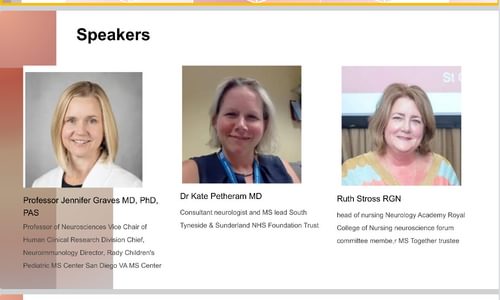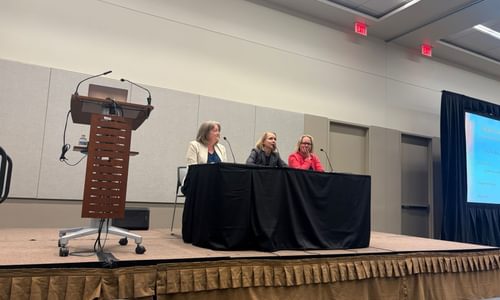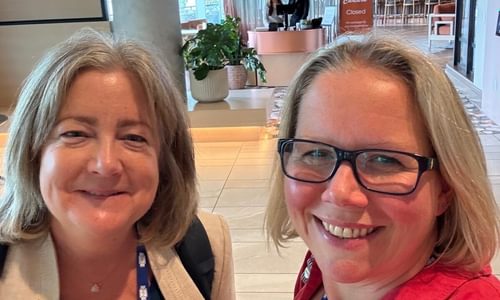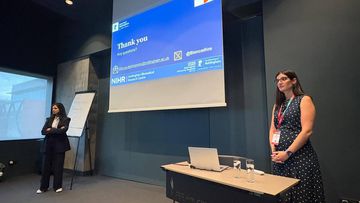Navigating MS together: building better pathways through research, education and collaboration
NewsWorld MS Day 2025 shines a light on the diagnostic journey in multiple sclerosis (MS), calling on the global community to share stories, raise awareness and campaign for change. At Neurology Academy, we’re proud to support this effort by driving forward education, collaboration and research that shapes better diagnostic and post-diagnostic experiences. This year, we highlight the work of Blanca, a researcher exploring vocational rehabilitation in MS; Amy Thompson, CEO and founder of MS Together; and the growing impact of our clinical education on real-world practice.
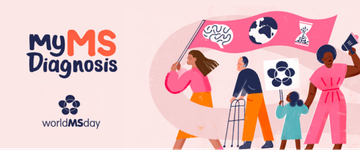
Diagnosis and beyond: the power of work and purpose
Receiving a diagnosis of MS can be a moment of uncertainty and vulnerability. For many, especially younger adults, fears about identity, independence and employment come sharply into focus. Dr Blanca De Dios Pérez, a post-PhD researcher with expertise in vocational rehabilitation in MS, is addressing these questions head-on through her current research.
Her work investigates how people with MS navigate employment after diagnosis, what support systems are most effective, and how services can better respond to individual goals. She is passionate about building inclusive, person-centred pathways that support people to remain in or return to meaningful work.
“Diagnosis isn’t just a medical moment – it has social, emotional, and economic dimensions,” Blanca explains. “We need to understand work not just as employment, but as a key part of self-worth, routine, and contribution. Vocational rehabilitation should be integrated into post-diagnostic care from the start.”
This research directly supports the ethos of ‘My MS Diagnosis: Navigating MS Together’, reminding us that true support goes far beyond symptom control.
Young voices, shared journeys: Amy Thompson and MS Together
To understand diagnosis through the eyes of those most affected, we spoke with Amy Thompson, founder and CEO of MS Together, a charity supporting young people aged 18-35 living with MS.
Amy, herself diagnosed in her twenties, knows how vital community and understanding are during early MS experiences.
“For younger people, the diagnosis experience can feel incredibly isolating,” she shares. “You’re often at a stage of building your life – your career, relationships, independence. To suddenly be told you have MS can feel like a derailment.”
MS Together offers peer support, wellbeing programmes, and safe spaces where young people can share openly and connect with others who “get it.”
Amy also highlights the gaps in post-diagnostic care. “We need more youth-informed resources, and more collaboration between healthcare and third-sector groups. That’s where change can really happen.”
Her work embodies the World MS Day message: navigating together through shared support, lived experience and advocacy. Watch our interview with Amy from last year’s World MS Day:
From reactive to proactive: lived experience and the nursing role in MS care
Nurses play a vital role in shaping early and ongoing MS support. In partnership with MS-UK and the Royal College of Nursing Neuroscience Forum, we recently hosted a webinar focused on how nurses can take a more proactive, personalised approach to MS care, grounded in empowerment and self-management.
“Very informative on the role nurses play in supporting people living with MS by encouraging self-management which is key to having control of MS.”
“I found particularly useful the stories from the people with MS and how they were and are being effectively supported through their condition.”
The webinar is now available to watch on demand on our website:
Education with impact: Neurology Academy in action
At Neurology Academy, we believe that better diagnosis begins with better-informed professionals. Our MS MasterClasses and educational initiatives continue to reach hundreds of healthcare professionals each year, equipping them with the skills and tools to provide person-centred, proactive care.
Highlights from our 2024 impact report include:
92% of learners reported improved confidence in recognising early MS symptoms.
88% made service-level changes following their training.
Clinical teams across the UK are now embedding more holistic approaches to post-diagnostic support, including shared decision-making and signposting to third-sector resources.
In our latest ‘education with impact’ reports, we are showcasing the inspiring workplace projects from last year’s Foundation and Advanced MasterClasses. Each project addressed a real-world challenge in MS care, from speeding up access to early treatment, to improving patient education, to building more efficient pathways. They’re practical, scalable solutions built by healthcare professionals who understand the system from the inside, and who want to make it better. Read the Foundation impact report here and the Advanced MasterClass report here.
We are proud to collaborate with organisations like MS Together and the MS Society, who endorse and contribute to the development of our courses, ensuring education is shaped by both clinical insight and real-life experience. Read more about how we collaborate with MS charities here.
Putting knowledge into practice: highlighting urinary incontinence in neurological disease
One of our recent collaborations with the British Journal of Neuroscience Nursing (BJNN) explores a frequently under-acknowledged area in neurology management: urinary incontinence. The article, authored by faculty from Uro-neurology Academy, offers an overview of continence assessment and management in neurological conditions, drawing attention to early symptom recognition and multidisciplinary care.
Though often dismissed as a “later stage” issue, bladder dysfunction can be one of the earliest and most distressing MS symptoms. Addressing this proactively at the diagnostic stage can significantly improve quality of life and reduce stigma. Read the full article here.
Exploring the intersection of menopause and MS: a transatlantic collaboration
In Phoenix, Arizona yesterday, a powerful and timely session took place exploring the intersection of menopause and MS. Menopause represents a major life transition, bringing with it profound biological, social and psychological effects. For individuals with long-term conditions like MS, the challenges of menopause can be even more complex. Many women struggle to differentiate between menopause symptoms and those of their MS, often turning to healthcare providers for guidance and proper management.
The presentation, delivered by USA based MS neurologist Prof Jennifer Graves, and UK-based MS neurologist Dr Kate Petheram and our head of nursing, Ruth Stross, highlighted the complexities around MS and menopause and introduced a pioneering UK patient education programme designed to support women with MS as they navigate the menopausal transition.
The session covered a wide spectrum of topics, starting with Prof Jennifer Graves exploring the impact of aging on the central nervous system and discussing whether menopause acts as a modifying risk factor for disability progression in MS, delving into the distinctions between chronological and biological aging and the broader context of the female life cycle. Then Dr Kate Petheram discussed the complex crossover of symptoms between MS and menopause – and the importance of acknowledging and addressing these overlapping challenges. Ruth Stross concluded the session with an in-depth look at the UK education programme, including patient case studies and a Q&A that sparked rich discussion and reflection.
Feedback from delegates was overwhelmingly positive. One neurologist commented, “I’ve been a practising neurologist for 28 years and not thought to ask this. I’ve learnt so much, thank you.” Another participant shared, “Thank you, there needs to be more discussions around women’s health and particularly menopause.” Nursing colleagues from Canada and the US expressed a strong desire to continue collaborating on this and other vital aspects of MS care.
Held just ahead of World MS Day, the session underscored the global relevance of women’s health in MS care – and the value of international collaboration in driving forward education and understanding.
Navigating MS together
World MS Day reminds us that diagnosis is not a standalone moment – it’s the first step in a complex, lifelong journey. Through research like Blanca’s, community voices like Amy’s, clinical education, and partnerships across sectors, that journey becomes more informed, compassionate and connected. We want to make sure every healthcare professional feels confident and prepared to navigate MS – together with the people they serve.
Related articles
Encouraging excellence, developing leaders, inspiring change
MS Academy was established in 2016 and in that time has accomplished a huge amount with exciting feedback demonstrating delegates feel inspired and energised along their personal and service development journeys. The various different levels of specialist MS training we offer are dedicated to case-based learning and practical application of cutting edge research.

